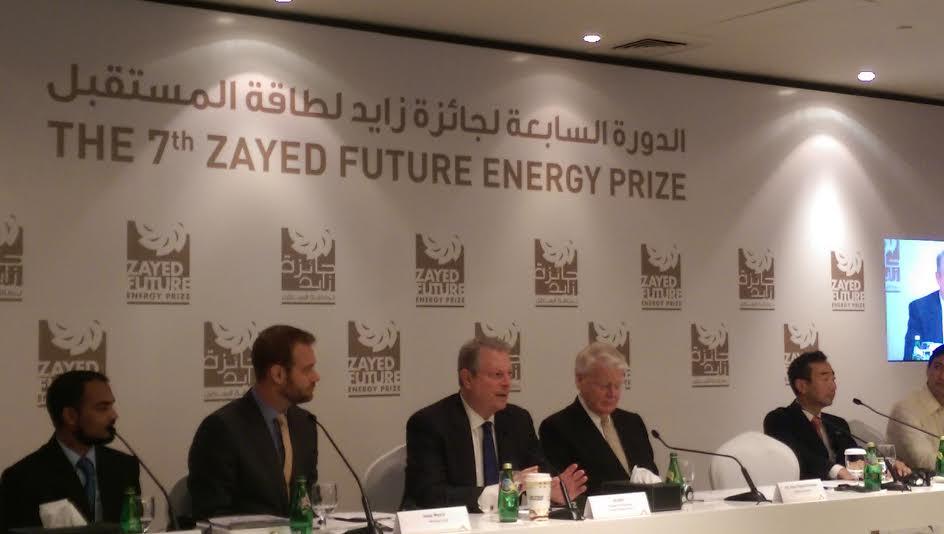
Abu Dhabi Sustainability Week, the annual conference that brings together over 30,000 professionals to meet on issues including energy, water and waste, kicked off yesterday. As always it started with a grandiose opening ceremony and a reminder of the United Arab Emirates’ achievements over the 40+ years since independence.
In addition to the panels, press conferences and massive exhibition halls, the winners of the annual Zayed Future Energy Prize (ZFEP, or the “Oscars” or “Nobel Prize” for clean energy), which included former U.S. Vice President Al Gore, were announced for 2015.
Founded in 2008, ZFEP awards US$4 million in prizes for both achievements and future potential in clean energy development. The committee who decides the final winners recognized Gore for his “unwavering personal and political commitment” to climate change, while constantly expressing optimism that the world community can take on the challenge. Gore said he would divert the US$500,000 cash award to The Climate Change Reality Project, an initiative he founded in 2006 to train activists to speak publicly about climate change’s risks and find more effective ways to communicate them.
While Gore may have been the marquee name, the other awards announced during the brief ceremony give an idea of how renewable energy and clean technology have become more mainstream across the globe. The other achievement award, which ZFEP gives to a large corporation, went to Panasonic. The iconic electronics manufacturer was lauded for its research and development work dedicated to solar energy, its advancements in battery technology and leadership in the development of Fujisawa Sustainable Smart Town.
Where ZFEP’s long-term impact could stand out globally is with the awards given to smaller organizations and schools. M-Kopa Solar, the awardee in the small and medium enterprise category, is an example of how renewables are no longer an expensive alternative for the wealthy -- but now are a key towards economic empowerment for the world’s poorest citizens. The Nairobi, Kenya-based company provides pay-as-you-go solar electricity systems that include a rechargeable radio, cell phone charging port and three lights — in turn allowing citizens in East Africa to forego buying expensive and dirty kerosene to power their homes.
On the nonprofit side, Liter of Light, a social enterprise launched in the Philippines, won the category for its work in expanding passive solar lighting to some of the world’s poorest communities.
Finally, five high schools across the world won awards for their projects seeking to phase out conventional electricity systems with renewable alternatives. Awardees included a high school in the Maldives that wants to install a 45-kilowatt solar system to deliver all of its power needs, along with another in Canada that will launch biomass heating and solar air connectors.
The prize competition, the cycle of which starts in the spring of each year, received almost 1,000 entries. For the first time this year, ZFEP gave an honorary award to Egyptian president Abdul Fattah al Sisi for his government’s commitment to sustainability. The most populated nation in the Arab world has committed to sourcing 20 percent of its energy from renewables by 2020 and is on track to install 4,300 megawatts of solar and wind power in the next three years.
More information on ZFEP, finalists, and past awardees can be found here.
Image credit: Leon Kaye
Based in California, Leon Kaye has also been featured in The Guardian, Clean Technica, Sustainable Brands, Earth911, Inhabitat, Architect Magazine and Wired.com. He shares his thoughts on his own site, GreenGoPost.com. Follow him on Twitter and Instagram.
Disclosure: Masdar covered Leon Kaye’s travel costs to Abu Dhabi.

Leon Kaye has written for 3p since 2010 and become executive editor in 2018. His previous work includes writing for the Guardian as well as other online and print publications. In addition, he's worked in sales executive roles within technology and financial research companies, as well as for a public relations firm, for which he consulted with one of the globe’s leading sustainability initiatives. Currently living in Central California, he’s traveled to 70-plus countries and has lived and worked in South Korea, the United Arab Emirates and Uruguay.
Leon’s an alum of Fresno State, the University of Maryland, Baltimore County and the University of Southern California's Marshall Business School. He enjoys traveling abroad as well as exploring California’s Central Coast and the Sierra Nevadas.














